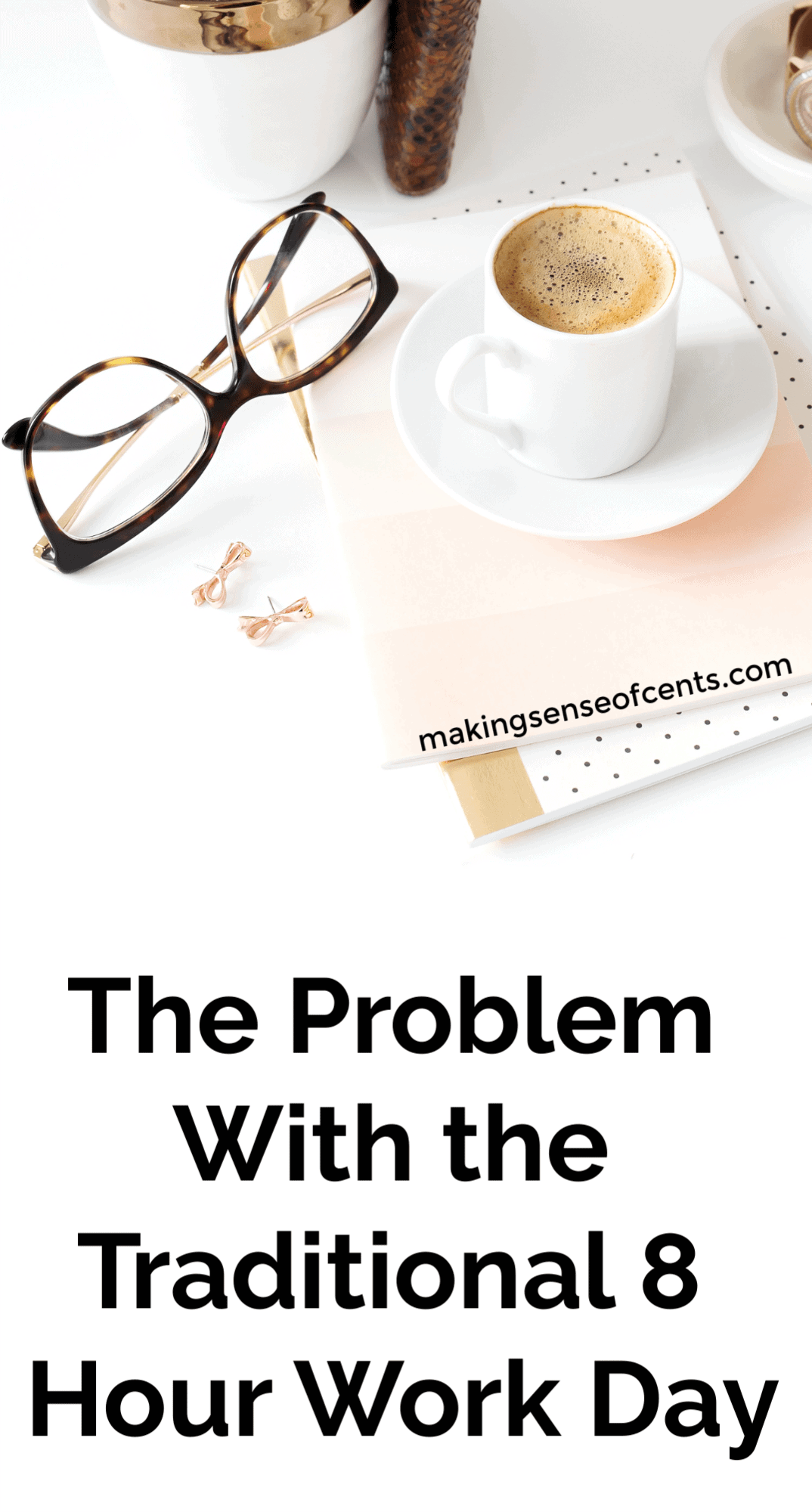 Today, we have a post from my friend and personal finance blogger Harry Campbell.
Today, we have a post from my friend and personal finance blogger Harry Campbell.
Harry started blogging about personal finance on his main site Your PF Pro a few years ago and enjoyed it so much that he started a second site dedicated to finding the perfect work-life balance at The Four Hour Work Day. When Harry is not blogging, he works full-time as an aerospace engineer and enjoys surfing and playing beach volleyball.
Traditionally, in the United States our work days have been 8 hours long and we trudge into the office 5 days per week (and 2 weeks of vacation time is standard).
This pattern dates back to the Industrial Revolution – yeah, the cultural and societal revolution that happened over 200 years ago. We’re usually a little bit slow to catch up to the rest of the world I guess.
You’d think by now we’d have realized our way of doing work is a little outdated.
You’d also think we might have come up with something that works a little better. But so far we haven’t.
As you’ve probably noticed, the model we’re stuck in now doesn’t make much sense. It seems like we’re only continuing to carry on with it because it’s one of those things we’ve “always” done.
But as companies strive to be more innovative and coax more productivity out of workers, we’re starting to question how great the set 8 hour workday really is. We’re realizing that this system comes with a lot of problems and challenges for modern employees and employers. Today’s millennials are demanding more of a work-life balance than ever and it’s up to employers to adapt.
Many Positions Don’t Actually Require 8 Hours Worth of Work Every Day
One of the most obvious problems, both for employees and employers, is that the 8 hour workday causes a whole lot of wasted time.
Many positions within companies don’t actually require an employee’s dedicated attention for 8 full hours, Monday through Friday for a total of 40 hours per week. When was the last time you worked a full 8 hours? And no, watching cat videos on Facebook does not count as work.
Employees are left bored and many are resentful of all the time they have to pass twiddling their thumbs at their desks. Employers are (perhaps not always knowingly) paying for many empty hours where nothing is getting done because there isn’t anything to do.
The way our current system is set up, we exchange time for money.
We show up 8 hours and our employers pay us for those 8 hours. The better way? Exchanging value for money. Not everyone takes 40 hours per week to do amazing work within their job, so why force talented people to adhere to a schedule that might not make sense?
The 8 Hour Workday Doesn’t Allow for Maximum Creativity and Productivity
As much as some companies may wish it were true, humans aren’t machines.
We don’t have on switches that can be flipped at 9am and then turn it all off at 5pm. While having a consistent schedule does help with efficiency and productivity, the normal 8 hour schedule most of us work now doesn’t take advantage of human beings’ natural rhythms and flows.
Personally, I know that I do my best work in the mornings from about 8 am – 11 am and at night from 8 pm – midnight.
People are more often creative and work best in blocks of time throughout the entire day with periods of rest and downtime in between. The set 8 hour workday doesn’t allow for this.
The brain isn’t designed to do hard work and constantly focus for that set amount of time without multiple breaks.
Additionally, some people are naturally better workers in the early morning hours, while others do their best work in the afternoons and still others are true night owls.
People Just Don’t Like the Restriction
If you’re supposed to get 8 hours of sleep per night, and you’re forced to work another 8 hours, that only leaves a third 8 hours for all the rest of your life.
Often, 2 of those hours are eaten up by a stressful commute to and from work and schedule you’re forced into, which realistically leaves only 6 hours for family, relaxation, exercise, hobbies, and chores or errands.
Unsurprisingly, this way of living can be extremely unsatisfying.
Companies that refuse to deviate from the traditional 8 hour work day may soon find that they lose their best workers and talent to either A. companies that are embracing more forward-thinking models and allow for remote work, flexible hours, or other alternatives to the old-school 9 to 5, or B. entrepreneurship.
Employees with a heavy skill set and a drive to succeed are realizing that there’s a better way than an enforced 8 hour workday. With the rise of side hustles and side businesses, more and more people are making the transition from working for someone else to working for themselves.
We’ve seen a lot of stories in recent years of the greed in Corporate America: board members flying private jets while their employees are getting laid off and large bonuses being awarded only to upper management.
Why would you toil away working your tail off when someone else gets to reap all the benefits?
The traditional 8 hour work day is, simply put, old and not useful to us anymore.
It’s an inefficient way to work, because it creates many hours of empty, wasted time. But times are changing. Employers are very slowly realizing that a new way of doing business is taking over, and employees are realizing that if they no longer find the 8 hour workday in someone else’s business is acceptable, they can run their own business, set their own schedule, and be in charge of their own freedom.
Readers, what do you think about working a traditional 8 hour work day? It might be a good starting point for most of us but doesn’t it make sense to find a more flexible job or go out on your own and start your own business?

Leave a Reply
I hate it!
Haha me too??
Tell me about it, I can’t do anything from 2-5 haha. I would take a nap if I could.
Yea I’ve heard about those types of start-up environments. I think I would enjoy that since you are still responsible for your work but it rewards people for being efficient with their time and good at their job.
“If you’re supposed to get 8 hours of sleep per night, and you’re forced to work another 8 hours, that only leaves a third 8 hours for all the rest of your life.” Ugh!!! This is just depressing!
Yea and I love my sleep so honestly I’d rather get 8-8.5 hours a night, that doesn’t leave much time for free activities 🙁
Haha yea I know what you mean. I think it works in certain industries and doesn’t in others.
Lately I’ve thought about the fact that the standard work week is a little less than ideal. Thoguh, since this practice has been in effect for decades, I don’t see it changing, though the workforce has changed in many ways because working IS easier for some jobs, but harder for others. The fact we don’t have much extra time after work (or we have a work schedule that restricts getting things like going to the Post Office, working out, other errands getting done) is stressful and has existed for years.
I work best during the same hours as you, early mornings. I’m a teacher, so I never work just a 40 hour work week, but I feel I’d be more effective if I spent less time in the school and was able to come home and do the 1-2 hours I work afterschool. I love my job and everything about it, but it’s annoying to always feel so exhausted at the end of the day, I can’t really get my own things done.
You’re right, the standard work day won’t be changing any time soon but that doesn’t mean you have to keep on doing it. Obviously if you want the safety of a corporate type job you’ll have to make sacrifice. But there are lots of unique ways to make money these days that give you more schedule flexibility and happiness 🙂
I complain a lot and my work is still pretty flexible when it comes to getting in/leaving and lunch breaks. I probably would have moved on a long time ago if my industry was strict 9 to 5.
I absolutely hate it! My work starts at 11PM and ends at 8PM & usually I come at home at 8:30PM, exhausted. Me and my wife watch one movie, tv show, then bed and that’s it, that’s whole day. What do I do at work? Listen to call recordings in headphones all the time & write resolutions. I don’t have enough free time. I can’t imagine how people are okay with such working hours and this 1 hour break at work doesn’t change anything for me. In short I spend more than 9 hours outside, in stupid office. I miss nature and quite place 🙁 And I can’t even afford to go with half-time work or quit, because salary is already not enough and my wife not working. Ughh, hate my life. Wish I could have psychologist to visit sometimes, but can’t afford it too lol.